Ronald Colman
- Ann Harding
- Posts: 1246
- Joined: January 11th, 2008, 11:03 am
- Location: Paris
- Contact:
I was really struck by his totally non-violent attitude when I compared the two Beau Geste. While Colman gives his character a genuine concern for his brothers as well as a tenderness towards John when he dies, in the remake, Gary Cooper (no matter how much I like the actor) gives a traditional gun-ho version: showing his pleasure at firing a gun and his death is deprived of the fine shading that makes Colman's so precious.
There is a very interesting volume about the 'masculine image' in American cinema showing the changes from the 20s to the 70s. Joan Mellen's Big Bad Wolves. She highlights the change from the 'sensitive' man of the 20s allowed to show tears, etc... to the more traditionnal macho man after WWII. I found her study fascinating.
There is a very interesting volume about the 'masculine image' in American cinema showing the changes from the 20s to the 70s. Joan Mellen's Big Bad Wolves. She highlights the change from the 'sensitive' man of the 20s allowed to show tears, etc... to the more traditionnal macho man after WWII. I found her study fascinating.
- Ann Harding
- Posts: 1246
- Joined: January 11th, 2008, 11:03 am
- Location: Paris
- Contact:
I bought recently a DVD recorder and I have started to transfer some of my VHS on DVD. One of them is a Goldwyn production called The Unholy Garden (1931) by George Fitzmaurice with Ronald Colman, Fay Wray and Estelle Taylor. This film boasts a script by Ben Hecht and Charles MacArthur, but, alas, it looks like a botch job done very quickly: Hecht, allegedly, dictated it in one night! 
Nevertheless, this extremely rare film is very interesting to watch for several reasons. The narrative is highly improbable, but, Colman delivers a very funny spoof characterisation of his bank robber, the cinematography by George Barnes and Gregg Toland is truly superb and on top, the film bears some stricking similarities with a French classic called Pépé le Moko (1936) by Julien Duvivier with Jean Gabin and Mireille Balin.
I have done some research about the subject. I discovered that Duvivier was a great fan of Hecht and MacArthur and watched many times Scarface (1932). So I wouldn't be surprised if he also watched The Unholy Garden (1931) and got from it some ideas regarding the sets, decoration and some basic plot ideas.
Here are some screen captures of both films so that you can compare by yourself:
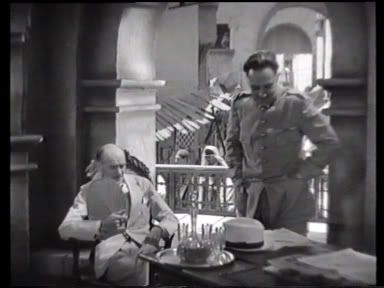
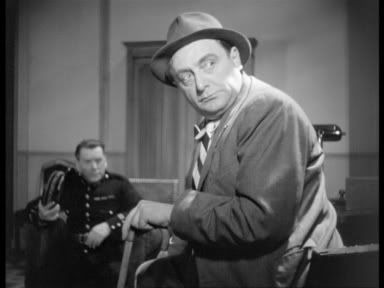
(Left: The Unholy Garden-Right: Pépé le Moko)
The prefect of police and the local police chief meet to discuss the arrest of a dangerous criminal: Barington Hunt, a bank robber (Ronald Colman) and Pépé, a gang master (Jean Gabin). Both are hiding in the Casbah, the old city of Algiers....
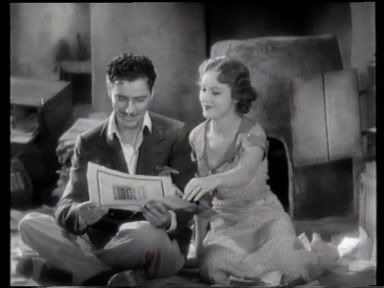
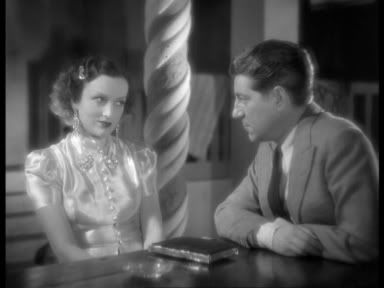
Barrington (Ronald Colman) discuss Paris and the olden days with Camille (Fay Wray) while Pépé (Jean Gabin) does the same with Gaby (Mireille Balin)
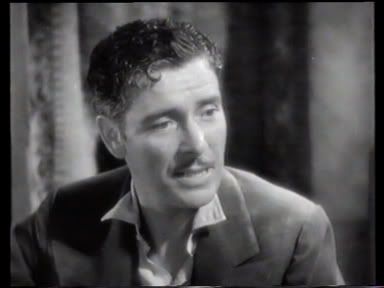
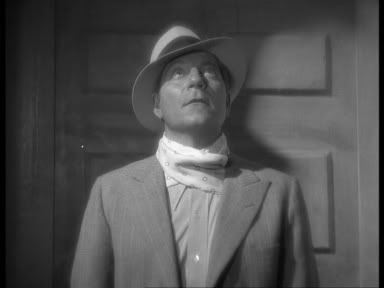
The look of the 'hero' is in both cases elaborate. Colman wears short curly hair, is always without a tie wearing a shapeless jacket and a long floppy pocket handkerchief. Gabin is always immaculately dressed with a tie or like in this picture with a pale scarf (it apparently started a fashion in the Paris criminal underworld!!!)
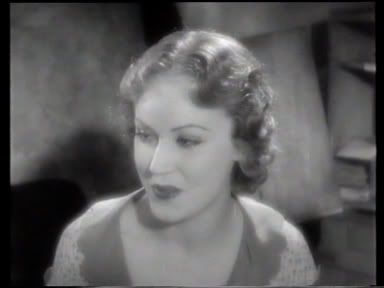
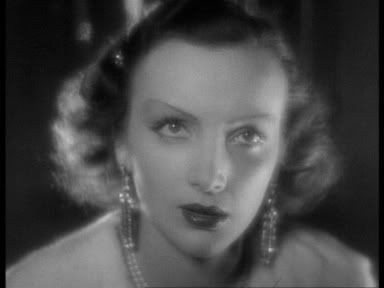
The heroine in Unholy Garden is a pure and innocent girl (Fay Wray) while Gaby (Mireille Balin) has a all the trappings of a femme fatale.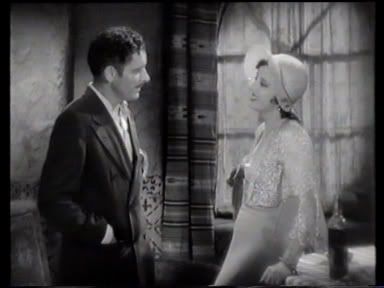
But, in Unholy Garden, there is a second lethal woman, Elise (Estelle Taylor) who works as a spy for the chief of police. Gaby is in a way a mixture of both women.
Obviously, Pépé le Moko is a masterpiece while The Unholy Garden is just a very amusing curio.
Nevertheless, this extremely rare film is very interesting to watch for several reasons. The narrative is highly improbable, but, Colman delivers a very funny spoof characterisation of his bank robber, the cinematography by George Barnes and Gregg Toland is truly superb and on top, the film bears some stricking similarities with a French classic called Pépé le Moko (1936) by Julien Duvivier with Jean Gabin and Mireille Balin.
I have done some research about the subject. I discovered that Duvivier was a great fan of Hecht and MacArthur and watched many times Scarface (1932). So I wouldn't be surprised if he also watched The Unholy Garden (1931) and got from it some ideas regarding the sets, decoration and some basic plot ideas.
Here are some screen captures of both films so that you can compare by yourself:


(Left: The Unholy Garden-Right: Pépé le Moko)
The prefect of police and the local police chief meet to discuss the arrest of a dangerous criminal: Barington Hunt, a bank robber (Ronald Colman) and Pépé, a gang master (Jean Gabin). Both are hiding in the Casbah, the old city of Algiers....


Barrington (Ronald Colman) discuss Paris and the olden days with Camille (Fay Wray) while Pépé (Jean Gabin) does the same with Gaby (Mireille Balin)


The look of the 'hero' is in both cases elaborate. Colman wears short curly hair, is always without a tie wearing a shapeless jacket and a long floppy pocket handkerchief. Gabin is always immaculately dressed with a tie or like in this picture with a pale scarf (it apparently started a fashion in the Paris criminal underworld!!!)


The heroine in Unholy Garden is a pure and innocent girl (Fay Wray) while Gaby (Mireille Balin) has a all the trappings of a femme fatale.

But, in Unholy Garden, there is a second lethal woman, Elise (Estelle Taylor) who works as a spy for the chief of police. Gaby is in a way a mixture of both women.
Obviously, Pépé le Moko is a masterpiece while The Unholy Garden is just a very amusing curio.
- charliechaplinfan
- Posts: 9040
- Joined: January 15th, 2008, 9:49 am
- moira finnie
- Administrator
- Posts: 8024
- Joined: April 9th, 2007, 6:34 pm
- Location: Earth
- Contact:
Thanks for the take on The Unholy Garden, Ann. It's been so long since I've seen this movie that all the details have fallen away from my memory but one: Colman's beguiling, sad charm. I hope I have another chance to see it someday.
You won't regret it, CCfan. Pépé le Moko is one of the best of the Julien Duvivier-Jean Gabin collaborations on screen. It is fascinating to see the content differences and almost frame for frame similarities between Gabin's performance in the French original and Charles Boyer's interpretation in the American version, Algiers, which was directed by John Cromwell. Both have their charms, though I must say M. Gabin is the best and most fatalistic. When you see the film you will probably see why too. I did keep wishing that Hedy Lamarr had been the personification of Paris for Gabin in the original. She is so beautiful in Algiers that a viewer half expects to detect the scent of her perfume when she's on screen.charliechaplinfan wrote:I've got to make time to Pepe Le Moko
- Ann Harding
- Posts: 1246
- Joined: January 11th, 2008, 11:03 am
- Location: Paris
- Contact:
I am glad you mentioned the Pépé le Moko's remake Algiers. First, this a blatant case of shot-for-shot remake which I cannot abide. There are several excerpts of Algiers on my DVD edition of Pépé le Moko. Seen back to back, Boyer's performance compared to Gabin looks highly mannered! (I should mention that I enjoy Boyer in many films). When I watched it with my mother, we both burst out laughing until we cried!!!  When Gabin sings his joy on the rooftop of the Casbah, it looks like a spontaneous exhilaration. In the Cromwell version, Boyer is polishing his shoes while singing......
When Gabin sings his joy on the rooftop of the Casbah, it looks like a spontaneous exhilaration. In the Cromwell version, Boyer is polishing his shoes while singing...... 
As for Lamarr, she is certainly breathtakingly beautiful, but I find her bland. I much prefer Mireille Ballin who has genuine chemistry with Gabin. They made several films together. I recommend particularly Gueule d'Amour (1937) where he looses his soul to her, again!
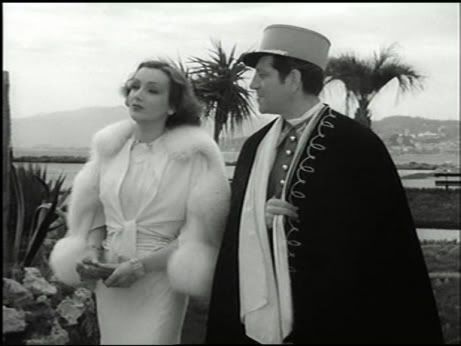
As for Lamarr, she is certainly breathtakingly beautiful, but I find her bland. I much prefer Mireille Ballin who has genuine chemistry with Gabin. They made several films together. I recommend particularly Gueule d'Amour (1937) where he looses his soul to her, again!

I'm a big fan of Colman, but haven't seen too many of his films beyond those on DVD.
He's one of the shining examples of "Forget Bad Accents, Just Talk" heroes of cinema.
But maybe I'm mistaken.
Is there ANY film where his accent is given an excuse or a justification? I don't think so. He has the same accent in LOST HORIZON as he does in RANDOM HARVEST, and in TALK OF THE TOWN.
And in the all-too-few others on DVD.
Yet, I don't think there's ever an 'excuse' given for this accent. Gosh - it's like, wow, he's Just Another Human and all other characters accecpt him as Human. No pish-posh about his accent, he makes no attempts to alter it - he just speaks his dialog. Gosh - as if the audience is gracious and smart enough to NOT worry about faux accents!
Am I wrong? Are there films of his where he's had to excuse or explain his accent in relationship to his locale?
He's one of the shining examples of "Forget Bad Accents, Just Talk" heroes of cinema.
But maybe I'm mistaken.
Is there ANY film where his accent is given an excuse or a justification? I don't think so. He has the same accent in LOST HORIZON as he does in RANDOM HARVEST, and in TALK OF THE TOWN.
And in the all-too-few others on DVD.
Yet, I don't think there's ever an 'excuse' given for this accent. Gosh - it's like, wow, he's Just Another Human and all other characters accecpt him as Human. No pish-posh about his accent, he makes no attempts to alter it - he just speaks his dialog. Gosh - as if the audience is gracious and smart enough to NOT worry about faux accents!
Am I wrong? Are there films of his where he's had to excuse or explain his accent in relationship to his locale?
- charliechaplinfan
- Posts: 9040
- Joined: January 15th, 2008, 9:49 am
Ollie, he has a lovely voice. I wouldn't want him to change it at all. I do take your point that his accent is quite cultured. I find most of his roles are learned or upper class so it doesn't seem out of place at all.
What you feel about Ronald Colman my husband feels about Cary Grant.
What you feel about Ronald Colman my husband feels about Cary Grant.
Failure is unimportant. It takes courage to make a fool of yourself - Charlie Chaplin
- silentscreen
- Posts: 701
- Joined: March 9th, 2008, 3:47 pm
- Ann Harding
- Posts: 1246
- Joined: January 11th, 2008, 11:03 am
- Location: Paris
- Contact:
Ollie: This is an interesting point. Colman always kept his English accent and never tried to hide it ever. But, in his career, there is a very clear line of transition: before the war and after. Before the war, he always played British characters (except probably his Russian émigré in Paris in The Man Who Broke The Bank at Monte-Carlo, 1936 and his François Villon, the French poet in If I Were King, 1938).
But, in 1940, he started to be cast as American. In Lucky Partners (1940), he is a Greenwich village artist; in The Talk of The Town (1942), the New England dean of a law university; in The Late George Apley (1947), a high-class Bostonian; in Champagne for Caesar (1950), again an American with PhD, but without a job!
So obviously, even, when he played American-type, he was cast either as upper-class or very cultured. This sudden change of nationality in films is quite typical of the time, the American pictures had lost their European market so they decided that they didn't need as many Europeans in their films.....
But, in 1940, he started to be cast as American. In Lucky Partners (1940), he is a Greenwich village artist; in The Talk of The Town (1942), the New England dean of a law university; in The Late George Apley (1947), a high-class Bostonian; in Champagne for Caesar (1950), again an American with PhD, but without a job!
So obviously, even, when he played American-type, he was cast either as upper-class or very cultured. This sudden change of nationality in films is quite typical of the time, the American pictures had lost their European market so they decided that they didn't need as many Europeans in their films.....
AnnH, the "American audience didn't need" comment makes me wonder. I believe we've still had a large number of Brit contributors (the James Bond folks, Michael Caine, Pierce Brosnan, Helen Mirren, Daniel Day Lewis and others). I'm not sure if the numbers are actually different or not, and I'm not sure how one could 'measure' those numbers - by percentage of appearances? Gag... oh please no.
But I HAVE an impression - similar to your statement - that the numbers are 'reduced'.
Maybe that's my myopia, though. I have so many favorite classic films where Brit actors have strong roles in them and I have considerably fewer favorite modern films (since 1970, for example) that have central Brit actors in them. Or maybe I don't consider too many modern films to be so infinitely rewatchable as I do the classics. I'll always take Basil Rathbone's Sherlocks over any 007, by the way. Ronald Colman over Pierce. Cary over Caine. Not to mention Errol - er, Aussie Errol, at least. And Laughton has films that trump them all. Then there's Greer Garson? Oh my...)
I wonder if the lack of writers' wisdom isn't one reason for 'lesser' roles by Brit actors in American films. Are modern writers so inundated (or is that "diluted"?) by so many American actors that they can't find the Alan Mowbrays and Mary Gardons, Dennis Hoeys, etc?
I really like Michael Caine in SHOCK TO THE SYSTEM (with barely a trace of Brit accent) and then in LITTLE VOICE (where he's deep in it).
But I HAVE an impression - similar to your statement - that the numbers are 'reduced'.
Maybe that's my myopia, though. I have so many favorite classic films where Brit actors have strong roles in them and I have considerably fewer favorite modern films (since 1970, for example) that have central Brit actors in them. Or maybe I don't consider too many modern films to be so infinitely rewatchable as I do the classics. I'll always take Basil Rathbone's Sherlocks over any 007, by the way. Ronald Colman over Pierce. Cary over Caine. Not to mention Errol - er, Aussie Errol, at least. And Laughton has films that trump them all. Then there's Greer Garson? Oh my...)
I wonder if the lack of writers' wisdom isn't one reason for 'lesser' roles by Brit actors in American films. Are modern writers so inundated (or is that "diluted"?) by so many American actors that they can't find the Alan Mowbrays and Mary Gardons, Dennis Hoeys, etc?
I really like Michael Caine in SHOCK TO THE SYSTEM (with barely a trace of Brit accent) and then in LITTLE VOICE (where he's deep in it).
- Ann Harding
- Posts: 1246
- Joined: January 11th, 2008, 11:03 am
- Location: Paris
- Contact:
Ollie, I think you misunderstood my statement. I was comparing 30s films to 40s productions, especially the war time ones. If you look at the films produced from 1940 to 1945, you'll realise that they have become much more 'American' in contents than they were during the 30s when directors like Lubitsch and Von Sternberg, or the Garbo productions were usually taking place in Europe. Greta Garbo is a good example, they made her an 'American' in her last movie, Two-Faced Woman. Studios had to cater exclusively for an American audience, so they reacted accordingly. Don't forget that the European market was huge and its loss was equally huge in financial terms for the studios.....
I am certainly not discussing more recent productions: the situation has changed tremendously. British actors are still attracted by Hollywood.
I am certainly not discussing more recent productions: the situation has changed tremendously. British actors are still attracted by Hollywood.
Yes, I understood that, yes. Thanks for additional comments, as always. Every time you dig up something, new crops of ideas appear.
Seven or 8 years ago, as I was getting into early Downloading, we found a lot of old Laurel & Hardy films which were in German. And Spanish. And French. Wow... these are all familiar shorts to me, and the dubbin - wait - that's not dubbing. Look - they're ACTUALLY speaking those languages!
With more research, I discovered they were accomplished enough in French, German and Spanish to re-shoot those shorts, scene for scene, 3 and 4 times (even an Italian L&H exists!) in a row, each with different languages being SPOKEN by all the actors.
"Why would they do that? Just showing off? Wow - good goin', guys!"
But the cost of re-dubbing voices, of finding dubbing-capable voice-actors, the technology of dubbing, etc - all of that was more expensive and more "iffy" than having The Boys do it themselves - on camera.
So the next question has to be, "Yeah, but why? Was it THAT economically viable?"
As AnnH states, "The European market was HUGE..."
So non-dubbed French, German, Spanish and Italian versions apparently paid for themselves.
Somewhere in the '30s, I think, this certainly slowed if not stopped altogether. But I'm not certain about this. Obviously, after WWII, dubbing and recording technology improved so much, and the far lower cost of recording studios allowed every studio and radio station to have at least several recording-only areas. This too wasn't so common 'in the old days'.
But I still wonder why the European Marketplace ceased to be "as important" after WWII as before it - at least economically to Hollywood. wonder if there were some anti-European sentiments going around "Jewish Hollywood"? I wonder if there was a feeling of "Look, we're giving them ENOUGH - we aren't going to waste time re-shooting films for them, too."
Or did the European theaters find a need to pay for themselves without sending cash back to American distributors and studios? Were they "standing on their own two feet" by funding their own film efforts and studios, and thus cloistered themselves off from the larger American film production catalogs?
Or was there an Anti-American Sentiment in the European theater industry that could have matched the Anti-European Sentiment by Hollywood?
There is certainly a lessened level of cooperation from American studios simply because they weren't re-shooting scenes in non-English languages. Was that due to low-cost dubbing or because the Americans were tired of doing it?
I've always wondered if Ronald Colman and so many others weren't part of a "brain drain" where Hollywood "stole" non American talent from European studios, and how resentful those studios might have been of such thievery.
Seven or 8 years ago, as I was getting into early Downloading, we found a lot of old Laurel & Hardy films which were in German. And Spanish. And French. Wow... these are all familiar shorts to me, and the dubbin - wait - that's not dubbing. Look - they're ACTUALLY speaking those languages!
With more research, I discovered they were accomplished enough in French, German and Spanish to re-shoot those shorts, scene for scene, 3 and 4 times (even an Italian L&H exists!) in a row, each with different languages being SPOKEN by all the actors.
"Why would they do that? Just showing off? Wow - good goin', guys!"
But the cost of re-dubbing voices, of finding dubbing-capable voice-actors, the technology of dubbing, etc - all of that was more expensive and more "iffy" than having The Boys do it themselves - on camera.
So the next question has to be, "Yeah, but why? Was it THAT economically viable?"
As AnnH states, "The European market was HUGE..."
So non-dubbed French, German, Spanish and Italian versions apparently paid for themselves.
Somewhere in the '30s, I think, this certainly slowed if not stopped altogether. But I'm not certain about this. Obviously, after WWII, dubbing and recording technology improved so much, and the far lower cost of recording studios allowed every studio and radio station to have at least several recording-only areas. This too wasn't so common 'in the old days'.
But I still wonder why the European Marketplace ceased to be "as important" after WWII as before it - at least economically to Hollywood. wonder if there were some anti-European sentiments going around "Jewish Hollywood"? I wonder if there was a feeling of "Look, we're giving them ENOUGH - we aren't going to waste time re-shooting films for them, too."
Or did the European theaters find a need to pay for themselves without sending cash back to American distributors and studios? Were they "standing on their own two feet" by funding their own film efforts and studios, and thus cloistered themselves off from the larger American film production catalogs?
Or was there an Anti-American Sentiment in the European theater industry that could have matched the Anti-European Sentiment by Hollywood?
There is certainly a lessened level of cooperation from American studios simply because they weren't re-shooting scenes in non-English languages. Was that due to low-cost dubbing or because the Americans were tired of doing it?
I've always wondered if Ronald Colman and so many others weren't part of a "brain drain" where Hollywood "stole" non American talent from European studios, and how resentful those studios might have been of such thievery.
- Ann Harding
- Posts: 1246
- Joined: January 11th, 2008, 11:03 am
- Location: Paris
- Contact:
I think, Ollie, you are mixing together many different issues. 
Whan sound arrived in 1927, it was impossible to dub films: post-synchronisation had not been invented. So as a result, American studios started to produce multi-lingual versions of films. Have a look at that thread which will give you more details:
http://www.silverscreenoasis.com/oasis/ ... php?t=1548
So obviously L&H and Buster Keaton made foreign versions of their films.
Quickly, roughly by the mid 30s, they managed to dub films in various languages. There was no need anymore for these multiple versions. American movies were again on all European screens. In 1939, with the war, the market was just physically closed. it reopened in 1945 with huge flood of American productions which had been made during the past 6 years. In Britain particularly, it hit British cinema quite badly. So they created some quotas to stop American imports which were killing their own productions. In the rest of Europe, American films were back on all the screens. In France, movie production has always been fairly important and probably didn't suffer as much.
If American cinema suffered in the 50s, it's because of TV and radio like in the US....
Whan sound arrived in 1927, it was impossible to dub films: post-synchronisation had not been invented. So as a result, American studios started to produce multi-lingual versions of films. Have a look at that thread which will give you more details:
http://www.silverscreenoasis.com/oasis/ ... php?t=1548
So obviously L&H and Buster Keaton made foreign versions of their films.
Quickly, roughly by the mid 30s, they managed to dub films in various languages. There was no need anymore for these multiple versions. American movies were again on all European screens. In 1939, with the war, the market was just physically closed. it reopened in 1945 with huge flood of American productions which had been made during the past 6 years. In Britain particularly, it hit British cinema quite badly. So they created some quotas to stop American imports which were killing their own productions. In the rest of Europe, American films were back on all the screens. In France, movie production has always been fairly important and probably didn't suffer as much.
If American cinema suffered in the 50s, it's because of TV and radio like in the US....
